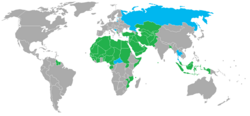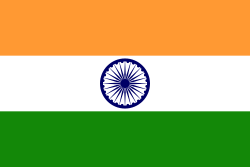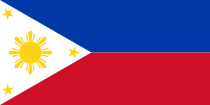Organisation of the Islamic Conference
|
|
||||
|---|---|---|---|---|
|
||||
 Map of OIC member states (green) and observers (blue).
|
||||
| Headquarters | Jeddah, Saudi Arabia | |||
| Official languages | Arabic, English, French | |||
| Membership | 57 member states | |||
| Leaders | ||||
| - | Secretary-General | Ekmeleddin İhsanoğlu | ||
| Website http://www.oic-oci.org/ |
||||
The Organisation of the Islamic Conference (OIC) is an international organisation with a permanent delegation to the United Nations. It groups 57 member states, from the Middle East, Africa, Central Asia, Caucasus, Balkans, Southeast Asia, South Asia and South America. The official languages of the organisation are Arabic, English and French.
Contents |
History and goals
Since the nineteenth century, Muslims had aspired ideas of uniting their community to serve their common political, economic, and social interests. Despite the presence of secularist, nationalist, and socialist ideologies, in modern Muslim states, King Faysal of Saudi Arabia cooperated with other Muslim leaders to form the Organisation of the Islamic Conference. The formation of the OIC happened in the backdrop of the loss of Muslim holy sites in Jerusalem. The final cause sufficiently compelled leaders of Muslim nations were to meet in Rabat to establish the OIC in May 1971.[1]
According to its charter, the OIC aims to preserve Islamic social and economic values; promote solidarity amongst member states; increase cooperation in social, economic, cultural, scientific, and political areas; uphold international peace and security; and advance education, particularly in the fields of science and technology.[1]
The flag of the OIC (shown above) has an overall green background (symbolic of Islam). In the center, there is an upward-facing red crescent enveloped in a white disc. On the disc the words "Allahu Akbar" are written in modern Arabic calligraphy.
On August 5, 1990, 45 foreign ministers of the OIC adopted the Cairo Declaration on Human Rights in Islam to serve as a guidance for the member states in the matters of human rights.
Recent issues
The Parliamentary Union of the OIC member states (PUOICM) was established in Iran in 1999 and its head office is situated in Tehran. Only OIC members are entitled to membership in the union.[2]
President George W. Bush announced on June 27, 2007 that the United States will establish an envoy to the OIC. Bush said of the envoy "Our special envoy will listen to and learn from representatives from Muslim states, and will share with them America's views and values."[3] Sada Cumber became the US representative on March 3, 2008.
The Organisation of the Islamic Conference rejected [4] the Universal Declaration of Humans Rights [5] as not being consistent with Sharia Law. In its place, they supported the Cairo Declaration of Human Rights in Islam [6]. While many claim it is not an alternative to the UDHR, but rather complementary, Article 24 states "All the rights and freedoms stipulated in this Declaration are subject to the Islamic Shari'ah." and Article 25 follows that with "The Islamic Shari'ah is the only source of reference for the explanation or clarification of any of the articles of this Declaration."
The Organisation of the Islamic Conference on March 28 2008 added its voice to the growing criticism of the film 'Fitna' by Dutch lawmaker Geert Wilders, which features disturbing images of violent acts juxtaposed with verses from the Quran.[7]
Ninth meeting of PUOICM
The ninth meeting of the Council of PUOICM was held on 15 and 16 Feb 2007 in Kuala Lumpur, Malaysia.[8]. Speaker of Malaysia's House of Representatives, Ramli bin Ngah Talib, delivered a speech at the beginning of the inaugural ceremony. OIC secretary-general Prof Dr Ekmeleddin Ihsanoglu said prior to the meeting that one main agenda item is stopping Israel from continuing its excavation at the Western Wall near the Al-Aqsa Mosque, Islam's third holiest shrine.[9] OIC is also discussing how it might send peacekeeping troops to Muslim states, as well as the possibility of a change in the name of the body and its charter.[10] Additionally, return of the sovereignty right to the Iraqi people along with withdrawal of foreign troops from Iraq is another one of the main issues on the agenda.[11]
Pakistani Foreign Minister Khurshid Mahmud Kasuri told reporters on 14 February 2007 that the Secretary General of OIC and foreign ministers of seven "like-minded Muslim countries" will meet in Islamabad on 25 February 2007 following meetings of President Musharraf with heads of key Muslim countries to discuss "a new initiative" for the resolution of the Israeli-Palestinian conflict. Kasuri said this will be a meeting of foreign ministers of key Muslim countries to discuss and prepare for a summit in Makkah Al Mukarramah to seek the resolution of the Arab-Israeli conflict.[12]
Structure and organisation
The OIC system consists of:
The Islamic Summit
The largest organ, attended by the Kings and the Heads of State and Government of the member states, convened every three years.
The Islamic Conference of Foreign Ministers
It meets once a year to examine a progress report on the implementation of its decisions taken within the framework of the policy defined by the Islamic Summit.
The Permanent Secretariat
It is the executive organ of the Organisation, entrusted with the implementation of the decisions of the two preceding bodies, and is located in Jeddah, Saudi Arabia. The current secretary general of this international organisation is Ekmeleddin İhsanoğlu, from Turkey, since January 1 2005.
Standing Committees
- Standing Committee on Information and Cultural Affairs (COMIAC).
- Standing Committee on Economic and Commercial Cooperation (COMCEC).
- Standing Committee on Scientific and Technological Cooperation (COMSTECH).
- Islamic Committee for Economic, Cultural and Social Affairs.
- Permanent Finance Committee.
- Financial Control Organ.
Subsidiary organs
- The Statistical, Economic and Social Research and Training Centre for Islamic Countries (SESRIC), located in Ankara, Turkey.
- The Research Centre for Islamic History, Art and Culture (IRCICA), located in Istanbul, Turkey.
- The Islamic University of Technology, located in Dhaka, Bangladesh.
- The Islamic Centre for the Development of Trade, located in Casablanca, Morocco.
- The Islamic Fiqh Academy, located in Jeddah, Saudi Arabia.
- The Executive Bureau of the Islamic Solidarity Fund and its Waqf, located in Jeddah, Saudi Arabia.
- The Islamic University In Niger, located in Say, Niger.
- The Islamic University In Uganda, located in Mbale, Uganda.
Specialised institutions
- The Islamic Educational, Scientific and Cultural Organization (ISESCO), located in Rabat, Morocco.
- The Islamic States Broadcasting Organisation (ISBO) and the International Islamic News Agency (IINA), located in Jeddah, Saudi Arabia.
Affiliated institutions
- Islamic Chamber of Commerce and Industry (ICCI), located in Karachi, Pakistan.
- World Islamic Economic Forum (WIEF), located in Kuala Lumpur, Malaysia.
- Organisation of Islamic Capitals and Cities (OICC), located in Jeddah, Saudi Arabia.
- Sports Federation of Islamic Solidarity Games, located in Riyadh, Saudi Arabia.
- Islamic Committee of the International Crescent (ICIC), located in Benghazi, Libya.
- Islamic Shipowners Association (ISA), located in Jeddah, Saudi Arabia.
- World Federation of International Arab-Islamic Schools, located in Jeddah, Saudi Arabia.
- International Association of Islamic Banks (IAIB), located in Jeddah, Saudi Arabia.
- Islamic Conference Youth Forum for Dialogue and Cooperation,(ICYF-DC)located in Istanbul, Turkey.
- General Council for Islamic Banks and Financial Institutions,(CIBAFI)located in Manama, Bahrain.
The Secretary General of the OIC
- Tunku Abdul Rahman (Malaysia): (1971-1973)
- Hassan Al-Touhami (Egypt): (1974-1975)
- Dr. Amadou Karim Gaye (Senegal): (1975-1979)
- Habib Chatty (Tunisia): (1979-1984)
- Syed Sharifuddin Pirzada (Pakistan): (1985-1988)
- Dr. Hamid Algabid (Niger): (1989-1996)
- Dr. Azeddine Laraki (Morocco): (1997-2000)
- Dr. Abdelouahed Belkeziz (Morocco): (2001-2004)
- Prof.Dr. Ekmeleddin İhsanoğlu (Turkey): (2005 to present)
Members
Note: The table can be sorted alphabetically or chronologically using the "><" icon.
| Country | Joined | Notes |
|---|---|---|
| 1969 | Suspended 1980 - March 1989 | |
| 1969 | ||
| 1969 | ||
| 1969 | Suspended May 1979 - March 1984 | |
| 1969 | ||
| 1969 | ||
| 1969 | ||
| 1969 | ||
| 1969 | ||
| 1969 | ||
| 1969 | ||
| 1969 | ||
| 1969 | ||
| 1969 | ||
| 1969 | ||
| 1969 | ||
| 1969 | ||
| 1969 | ||
| 1969 | ||
| 1969 | ||
| 1969 | ||
| 1969 | ||
| 1969 | ||
| 1969 | ||
| 1969 | From 1990 as Republic of Yemen united with People's Democratic Republic of Yemen | |
| 1970 | From 2003 as Kingdom of Bahrain | |
| 1970 | ||
| 1970 | ||
| 1970 | ||
| 1970 | ||
| 1972 | ||
| 1974 | ||
| 1974 | ||
| 1974 | ||
| 1974 | ||
| 1974 | ||
| 1975 | ||
| 1975 | ||
| 1976 | ||
| 1976 | ||
| 1976 | ||
| 1978 | ||
| 1982 | ||
| 1984 | ||
| 1986 | ||
| 1991 | ||
| 1992 | ||
| 1992 | ||
| 1992 | ||
| 1992 | ||
| 1994 | ||
| 1995 | ||
| 1995 | ||
| 1996 | ||
| 1997 | ||
| 1998 | ||
| 2001 | ||
| Suspended or Withdrawn | ||
| Jan 1993 | Withdrew August 1993 | |
| Observer States | ||
| 1994 | ||
| 1997 | ||
| 1979 | Official 2004 | |
| 1998 | ||
| 2005 | ||
| Observer Muslim Organisations and Communities | ||
| Moro National Liberation Front | 1977 | |
| Observer Islamic institutions | ||
| Parliamentary Union of the OIC Member States | 2000 | |
| Islamic Conference Youth Forum for Dialogue and Cooperation | 2005 | |
| Observer International Organizations | ||
| League of Arab States | 1975 | |
| United Nations | 1976 | |
| Non-Aligned Movement | 1977 | |
| Organization of African Unity | 1977 | |
| Economic Cooperation Organization | 1995 | |
Membership attempts

Member Members once temporarily suspended Withdrew Observer Attempted to join but blocked
 India - India has the third largest Muslim population in the world (after Indonesia and Pakistan) and has shown an interest in joining the OICs as an observer nation. While India's candidacy is supported by several OIC members including Saudi Arabia, Malaysia, Iran and Egypt,[13] some influential OIC members like Pakistan have blocked India's inclusion into the OIC. They argue that though India is home to more than 135 million Muslims, they form just over 13% of India's total population. (By comparison, Muslims form only 7.3% of Guyana's population, and no more than 15% of Russia's.)
India - India has the third largest Muslim population in the world (after Indonesia and Pakistan) and has shown an interest in joining the OICs as an observer nation. While India's candidacy is supported by several OIC members including Saudi Arabia, Malaysia, Iran and Egypt,[13] some influential OIC members like Pakistan have blocked India's inclusion into the OIC. They argue that though India is home to more than 135 million Muslims, they form just over 13% of India's total population. (By comparison, Muslims form only 7.3% of Guyana's population, and no more than 15% of Russia's.)
 Philippines - The Philippine government has made attempts to join the OIC, but this was opposed by the country's Muslim minority. Muslims make up only 5% (4.5 million) of the 90 million population in this predominantly Christian country (this estimate is disputed by the Bangsamoro people that put the Muslim population at 15 million).
Philippines - The Philippine government has made attempts to join the OIC, but this was opposed by the country's Muslim minority. Muslims make up only 5% (4.5 million) of the 90 million population in this predominantly Christian country (this estimate is disputed by the Bangsamoro people that put the Muslim population at 15 million).
Past Islamic Summit Conferences
| Number | Date | Country | Place |
|---|---|---|---|
| 1st | September 22 - September 25, 1969 | Rabat | |
| 2nd | February 22 - February 24, 1974 | Lahore | |
| 3rd | January 25 - January 29, 1981 | Makkah Al Mukarramah and Taif | |
| 4th | January 16 - January 19, 1984 | Casablanca | |
| 5th | January 26 - January 29, 1987 | Kuwait City | |
| 6th | December 9 - December 11, 1991 | Dakar | |
| 7th | December 13 - December 15, 1994 | Casablanca | |
| 1st Extraordinary | March 23, 1997 | Islamabad | |
| 8th | December 9 - December 11, 1997 | Tehran | |
| 9th | November 12 - November 13, 2000 | Doha | |
| 2nd Extraordinary | March 5, 2003 | Doha | |
| 10th | October 16 - October 17, 2003 | Putrajaya | |
| 3rd Extraordinary | December 7 - December 8, 2005 | Makkah Al Mukarramah | |
| 11th | March 13 - March 14, 2008 | Dakar |
Economy
The OIC members have a combined GDP (at PPP) of USD7,840 billion. The highest GDP in OIC belongs to Turkey with a GDP exceeding USD900 billion. The richest country on the basis of GDP per capita is Qatar at USD62,181 per capita.
Criticism
Due to its passive reaction and inability to react in time to the world events involving Muslim states and Muslims, the OIC is sometimes satirically called "Oh! I See."[14]
Thailand responsed harshly to OIC criticism of its battle within the Muslim majority provinces of Pattani, Yala and Narathiwat in the south of the country. In a statement issued on October 18, 2005 secretary-general Ihsanoglu vocalised concern over the continuing conflict in the south that "claimed the lives of innocent people and forced the migration of local people out of their places". He also stressed that the Thai government's security approach to the crisis would aggravate the situation and lead to continued violence. Thailand quickly rebuffed this criticism over its alleged heavy-handed policies. Then-Prime Minister Thaksin Shinawatra responded to the OIC Secretary General by saying: "I would like him to read the Qur’an, which stated clearly that all Muslims, regardless [of] where they live, must respect the law of that land." He asked, as in with Muslims killing each other in Iraq, "why don’t the OIC make statement of concern". The Thai Foreign Minister Kantathi Suphamongkhon went on to say: "We have made it clear to the OIC several times that the violence in the deep South is not caused by religious conflict and the government grants protection to all of our citizens no matter what religion they embrace. The Foreign Ministry issued a statement dismissing the OIC’s criticism and accusing it of disseminating misperceptions and misinformation about the situation in the southern provinces. "If the OIC secretariat really wants to promote the cause of peace and harmony in the three southern provinces of Thailand, the responsibility falls on the OIC secretariat to strongly condemn the militants, who are perpetrating these acts of violence against both Thai Muslims and Thai Buddhists."[15][16]
India have also hit out at the OIC for supporting Pakistan's claims to a plebiscite in Kashmir. Further to this, during the 2008 Amarnath land transfer imbroglio the OIC's condemnation of the "ongoing excessive and unwarranted use of force against the Kashmiri people" was met by an Indian response that said: "The OIC has once again chosen to comment upon Jammu and Kashmir and India's internal affairs on which it has no locus standi...To call for international involvement in the sovereign internal affairs of India is gratuitous, illegal and only reflects reversion to a mindset that has led to no good consequences for Pakistan in the past."[17].
References
- ↑ 1.0 1.1 "ORGANISATION OF THE ISLAMIC CONFERENCE", Encyclopedia of Islam and the Muslim World
- ↑ http://www2.irna.ir/en/news/view/menu-236/0702153662195331.htm
- ↑ http://www.guardian.co.uk/worldlatest/story/0,,-6740455,00.html
- ↑ http://europenews.dk/en/node/3847
- ↑ http://www.un.org/Overview/rights.html
- ↑ http://www1.umn.edu/humanrts/instree/cairodeclaration.html
- ↑ http://edition.cnn.com/2008/WORLD/europe/03/28/islam.film/index.html
- ↑ http://www.thepeninsulaqatar.com/Display_news.asp?section=Local_News&subsection=Qatar+News&month=February2007&file=Local_News2007021523026.xml
- ↑ http://www.bernama.com.my/bernama/v3/news.php?id=247167
- ↑ http://www.bernama.com.my/bernama/v3/news.php?id=247227
- ↑ http://www.indianmuslims.info/comment/reply/17638
- ↑ http://www.pakistanlink.com/Headlines/Feb07/15/05.htm
- ↑ An Indo-Arab blunder?
- ↑ http://www.spiritus-temporis.com/organization-of-the-islamic-conference/criticism-on-oic.html
- ↑ http://www.islamonline.net/English/News/2005-10/20/article08.shtml
- ↑ http://www.pataninews.net/ReadEnglish.asp?ID=130
- ↑ http://news.in.msn.com/national/article.aspx?cp-documentid=1630710 India rebuffs OIC comments on Kashmir
Notes
- Al-Huda, Qamar. "Organisation of the Islamic Conference." Encyclopedia of Islam and the Muslim World. Edited by Martin, Richard C. Macmillan Reference, 2004. vol. 1 p. 394. 20 April 2008
- Organization of The Islamic Conference. Islamic Summit Conference.
See also
|
|
- Cairo Declaration on Human Rights in Islam
- Islamic University of Technology
- International Islamic Relief Organization
- List of Organisation of the Islamic Conference member states by population
- Abdullah O. Nasseef
Further reading
- Ankerl, Guy Coexisting Contemporary Civilizations: Arabo-Muslim, Bharati, Chinese, and Western. Geneva, INUPress, 2000, ISBN 2-88155-004-5
External links
- Official The Organisation of the Islamic Conference
- Official Islamic Conference with documents and information from the latest Summit (Arabic, English, French)
- Official Permanent Delegation of the OIC to the United Nations
- Official The Statistical, Economic and Social Research and Training Centre for Islamic Countries (SESRIC)
- October 18 2003: speech from Dr Mahathir bin Mohamad speech at the 10th OIC Summit
- September 14 2001: statements from the Organisation of Islamic Conference
|
||||||||||||||||||
